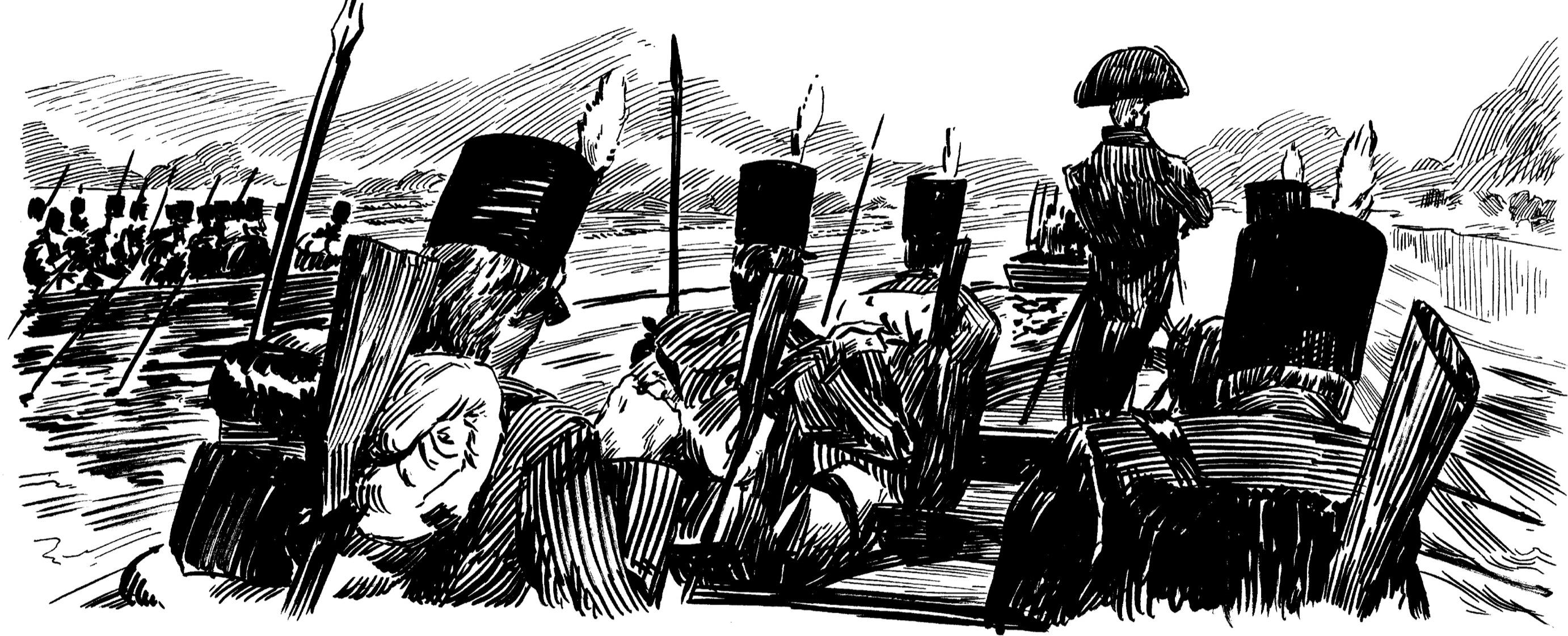CHAPTER 5
New Trouble with Old Enemies
Winning the Revolutionary War had not ended the United States’ problems with the king of England. On the high seas, American ships were attacked by the British. Their cargo was stolen, and American soldiers were captured and forced to serve on British ships.


The British made trouble on land as well. They had convinced some Native American tribes to help them attack American settlers on the western and northern borders of the United States. The Indians did not like the British, but they hated the American settlers even more.

On June 18, 1812, the United States declared war on Great Britain. This was called the War of 1812.
As head of the Tennessee militia, Jackson was called upon to assist in his state and the surrounding areas. Andrew was eager to fight the British again. He still blamed them for the death of his brothers and mother. “The hour of national vengeance is now at hand!” he told his men.
At one point, Andrew was ordered to bring his troops south to Natchez, Mississippi. The British were believed to be planning an attack on the neighboring state of Louisiana. Jackson’s men boarded thirty boats and headed down the Cumberland River. But when they arrived, there was no sign of the British.
It was the middle of winter and the conditions for the soldiers were very harsh. The men waited and waited in the brutal cold. When new orders finally came, Jackson was furious. He was being told to dismiss the troops and send them all the way back to Tennessee. To make matters worse, the soldiers would have to march back.
Jackson wasn’t about to abandon his men in their poor condition so far from home. He led the way five hundred miles from Natchez back to Nashville. He even used his own money to buy his men food along the way. The men started calling him “Old Hickory” after hickory wood, which is very hard and almost impossible to break. The nickname stayed with him from then on.

The fighting was not over for General Jackson. In August of 1813, the Creek Indian tribe called the Red Sticks attacked a fort in Alabama. Around 250 settlers were killed.

Chief Red Eagle, leader of the Red Sticks, had sided with the British in the war. So Jackson was called to bring in his militia. This time, his soldiers got their chance to fight.
The Creeks were fierce fighters, but so was Jackson. While his men called him “Old Hickory,” the Indians soon referred to him as “Sharp Knife.” Many of Jackson’s men died in battles with the Native Americans. However, many more Creeks were killed by the militia. In the Battle of Horseshoe Bend, over eight hundred Creeks died. After this, Chief Red Eagle surrendered, and the Creeks signed a treaty. The treaty gave over control of more than two million acres to the United States.

Chief Red Eagle


Yet, as hard as Andrew could be, he could also be kind. He rescued a Creek boy named Lyncoya, whose parents had been killed in the war. He brought Lyncoya back to the Hermitage. Andrew and Rachel adopted the boy and raised him from then on. In a letter to Rachel, Jackson wrote, “Tell Lyncoya I expect him to be a good boy.” Lyncoya received the same education as Andrew Jr. He lived at the Hermitage until he died from illness at only seventeen years old.

The US government was pleased with the job Jackson had done fighting the Creeks. He was promoted to Major General of the US Army. And now Andrew finally got to fight the British face-to-face. In the historic Battle of New Orleans, Jackson bravely led his troops to victory. It was a short but bloody battle. Nearly two thousand British soldiers were killed or missing. Amazingly, only eight of Jackson’s men were killed.

By the beginning of 1815, the War of 1812 was over. The US Congress presented Andrew with a medal of honor for his leadership. The people called him the greatest general since George Washington.
Andrew enjoyed the sudden fame that the war had brought him. Even so, he couldn’t wait to get home to Rachel. For the next few years, his life was peaceful, with Jackson overseeing the plantation. Then in 1817, General Jackson was called to duty once again, this time by President James Monroe.

President James Monroe
Andrew was needed in Florida. At the time, Florida was not yet a state. It was owned by Spain, but many Americans were beginning to settle in the area. The American government wanted to control Florida so that the United States would have a secure southern border.
The Spanish were not willing to give up Florida, but they did not have many troops there. Instead, much of the land was occupied by the Seminole Indian tribe, who the Spanish mostly left alone.

Seminole village in Florida
To protect their land, the tribe fought fiercely against General Jackson, but the war ended in defeat for the Seminoles. Spain sold Florida to the United States for $5 million. Jackson was appointed the military governor of the new state in 1821. No surprise, Andrew did not want to stay in Florida. As soon as he was able to, he returned home to Tennessee and Rachel.